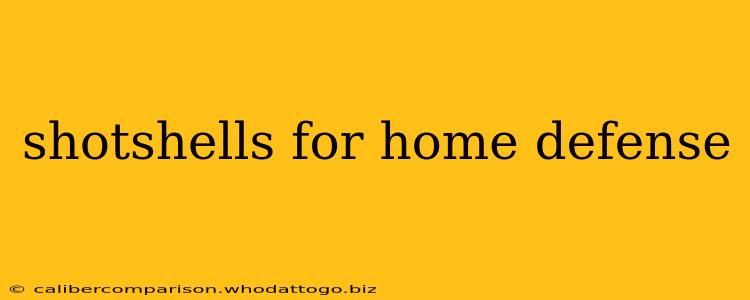Choosing the right ammunition for home defense is a critical decision, demanding careful consideration of various factors. While many opt for rifle or handgun cartridges, shotshells, fired from a shotgun, offer a unique set of advantages and disadvantages worth exploring. This guide delves into the specifics of using shotshells for home defense, helping you make an informed choice.
Understanding the Advantages of Shotshells for Home Defense
Shotshells provide several compelling reasons for their consideration as a home-defense round:
-
Stopping Power: The spread of pellets from a shotshell delivers significantly more kinetic energy upon impact than a single bullet. This increased energy translates to a higher probability of stopping a threat quickly, even through barriers. The wide pattern also increases the margin for error in aiming under stress.
-
Overpenetration Concerns: While overpenetration is a concern with any firearm, carefully selecting the appropriate shotshell gauge and load significantly mitigates this risk compared to high-powered rifle rounds. Smaller shot sizes, such as birdshot or #4 buckshot, offer less penetration than larger options like 00 buckshot.
-
Psychological Impact: The sound and visual impact of a shotgun blast can be a potent deterrent, potentially dissuading an intruder before a shot even needs to be fired.
Shotshell Types and Considerations for Home Defense
Several shotshell types are available, each with its own characteristics:
Gauge:
The gauge refers to the diameter of the barrel. Lower numbers indicate larger diameters (e.g., 12-gauge is larger than 20-gauge). 12-gauge shotguns are the most common for home defense due to their readily available ammunition and significant stopping power. 20-gauge shotguns offer a lighter recoil, which can be beneficial for smaller individuals or those less familiar with shotguns.
Shot Size:
Shot size dictates the pellet diameter. Smaller shot sizes (e.g., birdshot, #4 buckshot) have less penetration but a wider spread, making them better suited for close-quarters home defense where overpenetration is a major concern. Larger shot sizes (e.g., 00 buckshot) offer greater penetration but a tighter pattern, potentially increasing the risk of overpenetration.
Load Type:
Different loads offer varying shot sizes, pellet counts, and projectile types (e.g., slugs). Buckshot loads are most commonly used for home defense due to their stopping power and manageable overpenetration. Birdshot is less effective but better for minimizing overpenetration. Slugs deliver the highest penetration but should be avoided in homes due to the increased risk of collateral damage.
The Disadvantages of Shotshells for Home Defense
While offering substantial advantages, shotshells also present some drawbacks:
-
Recoil: Shotguns, especially 12-gauge, produce significant recoil. This recoil can be challenging for inexperienced shooters, potentially impacting accuracy and follow-up shots under stress.
-
Spread Pattern: The wide spread of pellets requires accurate shot placement at closer ranges to ensure effectiveness. At longer ranges, the pattern widens significantly, decreasing accuracy and making hits less likely.
-
Limited Capacity: Most shotguns have smaller magazine capacities compared to handguns or rifles, potentially limiting the number of shots available in a prolonged confrontation.
Conclusion: Making the Right Choice
Choosing the right shotshell for home defense requires careful consideration of the advantages and disadvantages outlined above. Selecting the appropriate gauge, shot size, and load type is crucial to striking a balance between stopping power and minimizing overpenetration. Remember to always prioritize safety and practice regularly to become proficient with your chosen firearm and ammunition. Consulting with a firearms expert or experienced shooter can further assist in making an informed and responsible decision. This information is for educational purposes only and should not be considered professional firearms advice. Always check your local laws and regulations regarding firearm ownership and usage before making any purchase.

